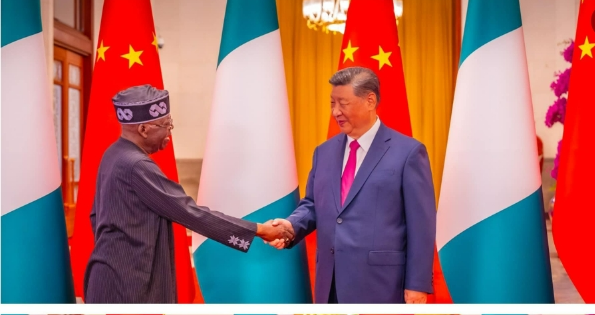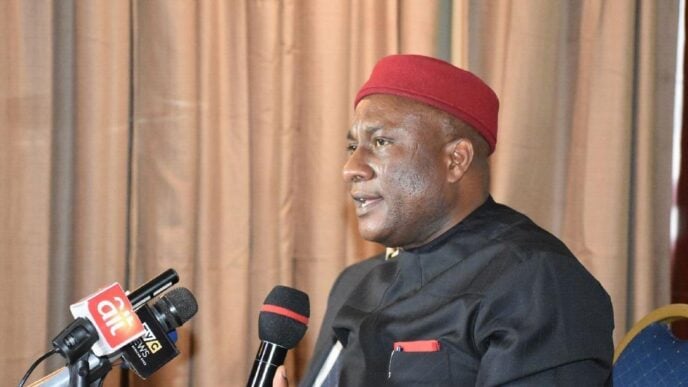President Bola Tinubu and Xi Jinping, President of China
BY VICTOR LIMAN AND ADE ADEFEKO
Nigeria’s relationship with China has grown into one of the most important bilateral partnerships shaping the country’s economic landscape. Over the past two decades, this alliance has transformed Nigeria’s infrastructure, deepened trade ties, and unlocked new investment channels. However, the relationship has also spotlighted structural imbalances that threaten Nigeria’s long-term economic stability. To maximize the benefits of this strategic partnership, Nigeria must recalibrate its trade, investment, and foreign policy stance with China—prioritizing national interests, fostering domestic industries, and ensuring sustainable growth.
China’s economic engagement with Nigeria is robust and multifaceted. Bilateral trade reached over
$19 billion in 2019, making China Nigeria’s largest trading partner. From financing critical infrastructure projects like the Abuja-Kaduna Railway to building Nigeria’s telecommunications backbone, China’s footprint is visible across key sectors. Chinese loans have propelled ambitious projects, addressing Nigeria’s infrastructure deficit.
However, beneath the surface lies a glaring asymmetry. Nigerian imports from China far outstrip exports, creating a trade imbalance that undermines local manufacturing. The influx of cheaper Chinese goods has contributed to the collapse of domestic industries, notably the textile sector. Moreover, Nigeria’s rising debt to China, which stands at over $3 billion, raises concerns about debt sustainability and economic sovereignty.
Advertisement
To ensure a mutually beneficial relationship, Nigeria must move beyond the role of a passive recipient and reposition itself as a strategic player. This calls for a shift in policy, emphasizing diversification, industrial growth, and economic self-reliance. Recalibration should focus on three critical areas: trade policies, investment frameworks, and foreign policy alignment.
Nigeria must tackle the persistent trade imbalance by negotiating better terms of trade and expanding export opportunities to China. Currently, Nigeria’s exports to China are heavily reliant on raw materials, particularly oil, leaving the economy vulnerable to price fluctuations and market volatility.
Nigeria should leverage its agricultural and mineral resources to develop value-added products for export. By focusing on processed goods—such as agricultural produce, textiles, and manufactured products—Nigeria can reduce over-reliance on oil. Nigeria must implement protective tariffs and anti- dumping measures to shield domestic industries from cheap Chinese imports, fostering local production and job creation. Trade agreements with China should emphasize market access for Nigerian goods, ensuring Chinese markets are open to Nigerian products beyond oil.
Advertisement
Chinese investments in Nigeria are largely concentrated in infrastructure, often financed through concessional loans. While these projects address critical deficits, they rarely transfer technological know-how or spur significant local employment. Nigeria must prioritize investments that generate long- term economic value.
Infrastructure contracts with Chinese firms should mandate the inclusion of Nigerian companies and labor. This ensures skills transfer and strengthens local industries.Nigeria must also push for joint ventures and technology-sharing agreements, particularly in sectors like telecommunications, agriculture, and manufacturing. Establishing SEZs with Chinese partners, focused on manufacturing and export-oriented industries, can drive industrialization and reduce dependence on imports.
China’s infrastructure financing has been a double-edged sword for Nigeria. While loans have propelled development, rising debt levels pose long-term risks. Nigeria must adopt smarter borrowing practices and diversify its financing sources. Nigeria must ensure transparency in loan agreements, subjecting all Chinese-financed projects to rigorous cost-benefit analyses.
Rather than relying solely on state-backed loans, Nigeria should prioritize PPPs, allowing private sector participation in infrastructure projects. Future loans should target projects that have clear revenue- generating potential, ensuring that debt servicing does not become a fiscal burden.
Advertisement
Nigeria’s foreign policy towards China should reflect assertiveness and strategic engagement. While China remains an indispensable partner, Nigeria must diversify its alliances to avoid over-reliance on any single country. Nigeria can amplify its bargaining power by aligning with other African nations facing similar trade imbalances with China, presenting a united front in negotiations. Engaging with institutions like the African Union and the World Trade Organization (WTO) can help Nigeria advocate for fairer trade practices and dispute resolution mechanisms. Nigeria must strike a balance between China, the West, and emerging economies, ensuring that its partnerships serve national interests without compromising its sovereignty.
One of the most sustainable ways to reposition Nigeria’s trade relationship with China is to build resilient domestic industries capable of competing in global markets. China’s economic rise was built on nurturing local industries—Nigeria must adopt a similar approach. Nigeria should implement policies that incentivize local production, support SMEs, and foster innovation. Technical and vocational education must align with industrial needs, equipping Nigerians with the skills required for emerging industries. Beyond Chinese-funded projects, Nigeria must mobilize domestic resources and regional cooperation to expand infrastructure independently.
Nigeria’s partnership with China presents both immense opportunities and significant risks. By restructuring trade dynamics, recalibrating investment policies, and pursuing assertive foreign policy strategies, Nigeria can transform its relationship with China into a catalyst for sustainable growth. The road ahead requires bold leadership, strategic foresight, and unwavering commitment to national development.
As Africa’s largest economy, Nigeria has the potential to shape not only its future but also the contours of Sino-African relations. In doing so, Nigeria can emerge as a formidable economic power, charting a path of prosperity that resonates across the continent and beyond.
Advertisement
Liman was the former Chief Trade Negotiator of Nigeria and Acting Director General, Nigerian Office for Trade Negotiations. He was also the Head and Trade Commissioner, Nigeria Regional Investment and Trade Office, Shanghai, China; with concurrent mandate to oversee the South Asian countries’ trade relations with Nigeria ([email protected])
Adefeko is director of corporate and regulatory affairs at Olam Agri,chairman of the Industrial Group, Lagos Chamber of Commerce and Industry (LCCI), and honorary consul of Botswana in Lagos ([email protected])
Advertisement
Views expressed by contributors are strictly personal and not of TheCable.
Add a comment









